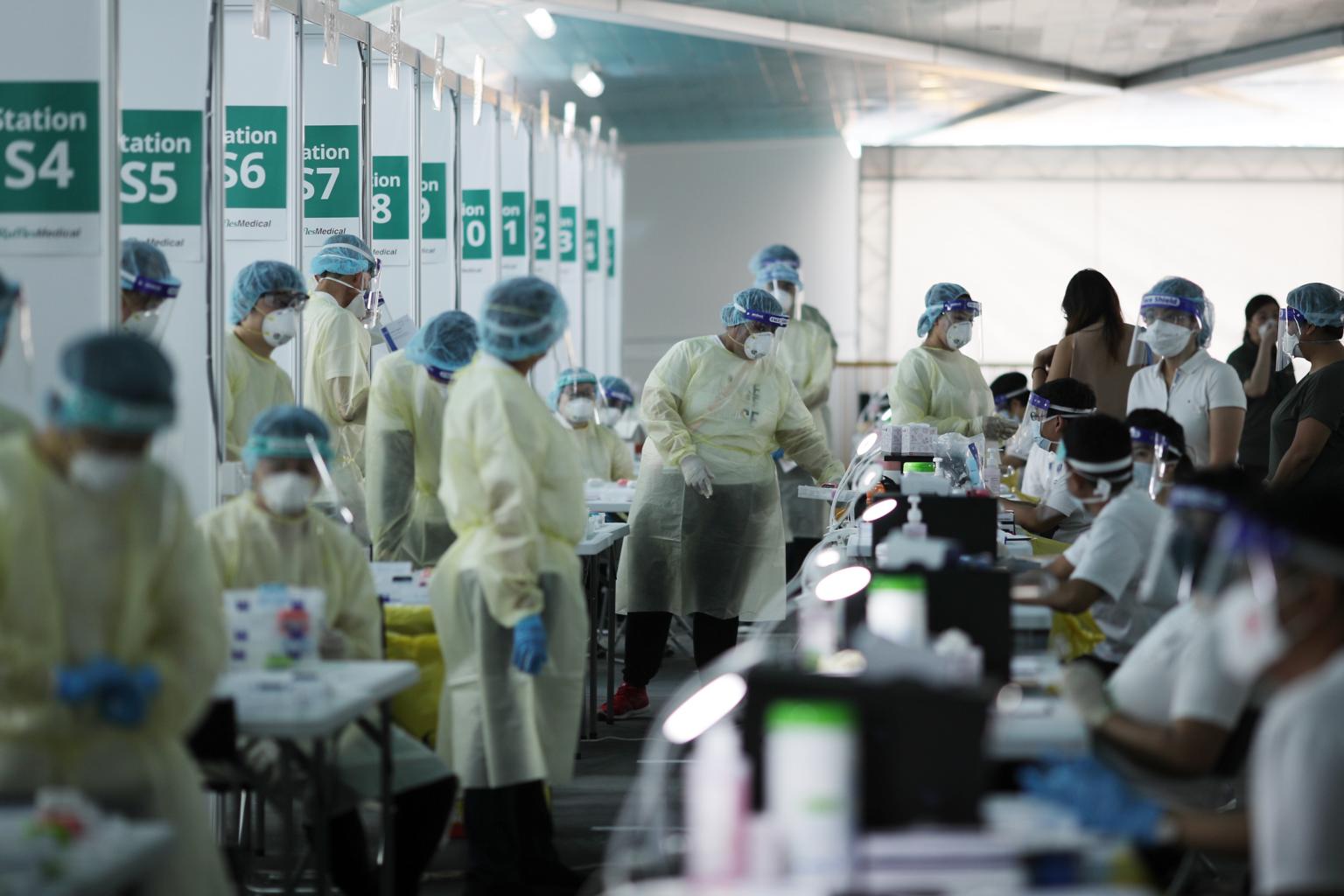Rapid Covid-19 testing done before start of events in Singapore yet to pick up any positive cases
Sign up now: Get ST's newsletters delivered to your inbox

Covid-19 swab testing for people before boarding the World Dream cruise ship at Marina Bay Cruise Centre on Nov 6, 2020.
ST PHOTO: JASON QUAH
Follow topic:
SINGAPORE - Rapid testing being conducted at larger events has yet to pick up any positive Covid-19 cases, the director of medical services (DMS) at the Ministry of Health, Associate Professor Kenneth Mak, said on Tuesday (Nov 10).
Singapore is piloting the use of these tests as an important part of its strategy for stemming the spread of the coronavirus that will allow for larger gatherings in phase three of its re-opening, he said.
The antigen rapid tests give results within half an hour, enabling the quick detection of cases, and allowing for people who are positive to be isolated.
"These tests have not yet yielded positive results, but this is consistent with the current situation that we have, where the community prevalence rate in Singapore is very low," said Prof Mak at Tuesday's virtual multi-ministry task force (MTF) briefing.
"We've used these pilot (tests) as a means of validating our processes in terms of how we would organise testing to be done, either on site or off site before the event, with certificates issued and then allowing entry into these events."
The tests were introduced in a pilot scheme just late last month, and were tried out in events such as the Singapore International Energy Week and the ONE Championship Mixed Martial Arts events.
On the first day of Singapore International Energy Week, swabbers at a testing station took nasal swabs from 215 participants by inserting a swab stick about 2.5cm up their nostrils and twirling it several times. Participants waited about 15-30 minutes for their results, which were sent via SMS.
These antigen rapid tests, provided as part of the pilot scheme, were free of charge to participants.
Prof Mak said the pilot testing will continue, and grow in scale.
Health Minister Gan Kim Yong said at the same briefing: "We will continue to pilot different workflows in various settings, such as at more business to business events, live performances, as well as spectator sports, and pre-event testing can form part of our strategy against Covid-19."
More types of rapid tests will also be tried out, said Prof Mak.
"We've been looking at different types of antigen rapid tests, and we hope to expand the armamentarium of such tests... so that there's a greater degree of choice and greater capacity that we will have in place to allow more of such testing to take place," he said.
Antigen rapid tests are less accurate than polymerase chain reaction or PCR tests, which are currently used to confirm coronavirus cases and remain the gold standard in Covid-19 testing today.
Hence, any positive results that are picked up from antigen rapid tests will still have to be validated and confirmed using PCR tests, Prof Mak said.
Such rapid tests detect specific proteins - known as antigens - on the virus' surface, while PCR tests detect the genetic material of the coronavirus.
As these antigen rapid tests will not pick up every single Covid-19 case, there is still a need to adhere to the same safe management measures, such as mask-wearing, safe distancing, group size and capacity limits, at events.
Prof Mak also said the costs of rapid tests have come down, and authorities are looking to see if they can reduce the costs associated with having it conducted en masse.
"We are increasing the access to these test, by decentralising and allowing more private test providers to make these tests available to members of the public," he said.
"These tests will not be subsidised and the cost would be paid for by those who seek these tests at these private labs."
Education Minister Lawrence Wong, who co-chairs the multi-ministry Covid-19 task force, said at the briefing that Singapore is considering whether to make it mandatory for some events to provide antigen rapid tests.
"If and when we make pre-event or pre-entry testing a requirement for certain larger-scale activities to happen in phase three (of Singapore's reopening), then, indeed, the organisers of the events can avail themselves of the antigen testing protocols that are already available in the market at that time," he said.

